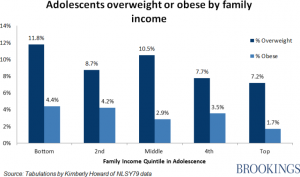Money controls so many aspects of our lives—including our health. I’ve never given much thought to the existing correlation between poverty and obesity, but it’s there and it’s huge (pun intended).

Between 2003 and 2007, obesity rates increased by 10 percent for low-income children; children from lower income households are twice as likely to be obese than children from higher income families.
It makes sense, when you think about it.
Parents of low-income households typically work long hours. After coming home late from work, it’s not likely they’ll have the energy to cook a healthy meal. Fast food is cheap, easily accessible and convenient; low-income communities have a greater availability of chain restaurants, which serve high-sugar, high-fat and calorie dense foods.
And it doesn’t help that healthier, fresh food is more expensive and can perish faster. Refined grains and processed foods are cheaper in bulk and last longer, whereas fruits and vegetables have to be eaten quickly, lest they spoil. Low-income families are less likely to spend more money on foods that won’t last them as long, and that contributes to obesity.
Children from low-income households already have so many obstacles to overcome; after facing lack of economic mobility, lower quality of education and less opportunities to grow personally and professionally, it’s a shame that their health is also on the line, especially because they had no choice but to be born into a low-income life.




